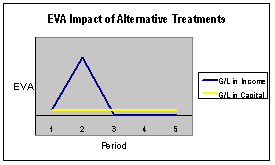Option 1: Treat as an operating item

While this treatment results in all of the behavioral problems cited before, there are certain circumstances when this treatment makes some sense. Certain asset sales may in fact be a frequent or recurrent part of the business. For example, if you own a lot of trucks and are regularly retiring old trucks and getting new ones, then the gains or losses should not be very large and it may not be worth treating such a volume of transactions as "extraordinary" with an alternative treatment.
Also, certain sales, even if they are infrequent, may be very small. It can get impractical to adjust every kind of disposition as a non-recurring transaction that should be capitalized.
Keep in mind, though, that however small the asset or the transaction, this treatment will always create a bias toward selling rather than operating.